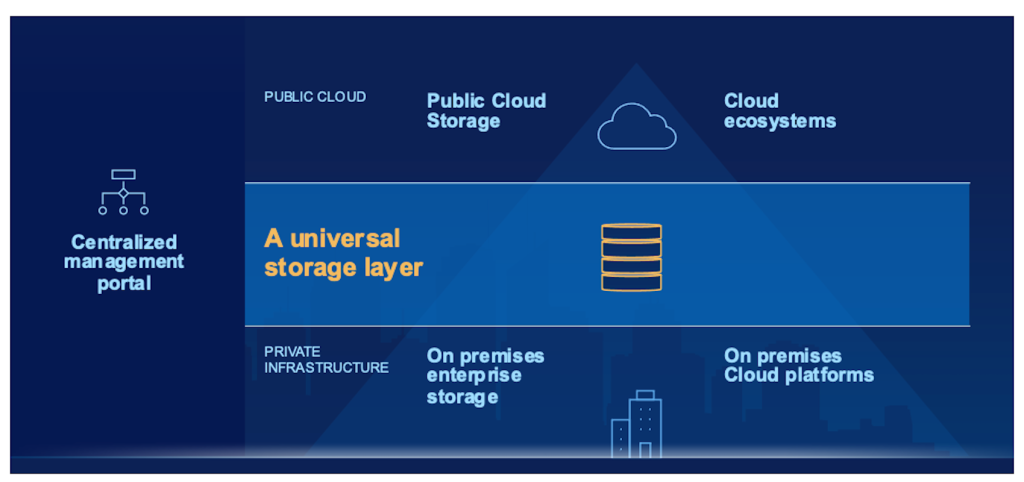Universal Cloud Storage Service: Trusted and Scalable Solutions for Organizations
Universal Cloud Storage Service: Trusted and Scalable Solutions for Organizations
Blog Article
Exploring the Role of Universal Cloud Storage Services in Information Protection and Compliance
As services progressively count on cloud storage space solutions to take care of and safeguard their data, discovering the intricate duty these services play in ensuring information safety and security and conference regulatory standards is important. By delving right into the nuances of universal cloud storage space services, a clearer understanding of their impact on information safety and security and regulative compliance arises, dropping light on the complexities and possibilities that lie in advance.
Significance of Cloud Storage Solutions
Cloud storage space solutions play a pivotal function in contemporary information monitoring techniques due to their scalability, access, and cost-effectiveness. With the exponential development of data in today's digital age, organizations are progressively turning to cloud storage space services to satisfy their developing demands. Scalability is a crucial benefit of cloud storage, enabling companies to easily adjust their storage ability as information needs rise and fall. This adaptability makes sure that business can efficiently manage their information without the demand for significant ahead of time investments in hardware infrastructure.
Ease of access is one more important facet of cloud storage space services. By saving data in the cloud, users can access their info from anywhere with a net link, promoting partnership and remote work. This ease of access advertises functional performance and makes it possible for seamless sharing of data throughout teams and locations.
In addition, lots of cloud storage service providers offer pay-as-you-go rates models, allowing organizations to pay only for the storage space capacity they use. Overall, the value of cloud storage space services lies in their capability to improve information monitoring procedures, boost ease of access, and lower operational costs.
Information Defense Methods With Cloud
By encrypting information prior to it is uploaded to the cloud and keeping control over the file encryption tricks, organizations can avoid unapproved access and reduce the threat of information violations. Multi-factor authentication, strong password policies, and normal access evaluations are some strategies that can enhance data security in cloud storage space services.
Regularly supporting information is another crucial facet of information protection in the cloud. By creating backups stored in different locations, organizations can make sure information availability and durability in case of unanticipated events such as cyber-attacks, equipment failings, or all-natural disasters. Furthermore, carrying out regular protection audits and evaluations can aid recognize vulnerabilities and make sure compliance with information protection regulations. By combining security, access controls, backups, and routine safety and security evaluations, organizations can develop a robust data protection approach in cloud settings.
Conformity Considerations in Cloud Storage Space
Provided the crucial nature of data defense approaches in cloud environments, companies must also prioritize compliance factors to consider when it concerns keeping data in the cloud. Conformity requirements differ across markets and areas, making it essential for companies to understand and stick to the pertinent policies. When making use of cloud storage solutions, organizations need to make sure that the provider complies with industry-specific criteria such as GDPR, HIPAA, or PCI DSS, relying on the kind of information being saved. Furthermore, organizations should take into consideration data residency demands to ensure that data is saved in compliant places.

Difficulties and Solutions in Cloud Protection
Making sure durable safety steps in cloud environments offers a multifaceted challenge for companies today. Among the primary challenges in cloud safety is information violations. Malicious actors constantly target cloud systems to get unapproved accessibility to sensitive information. To reduce this risk, organizations have to implement strong encryption protocols, accessibility controls, and normal safety click resources audits. One more difficulty is the shared responsibility model in cloud computer, where both the cloud service provider and the customer are accountable for various facets of safety and security. This can result in complication and voids in security coverage otherwise clearly defined. Organizations needs to plainly outline duties and responsibilities to ensure extensive protection steps remain in place.

Future Trends in Cloud Data Protection
The developing landscape of cloud information security is noted by a growing emphasis on proactive protection approaches and flexible protection actions (universal cloud storage). As innovation developments and cyber risks end up being a lot more advanced, companies are progressively focusing on predictive analytics, expert system, and equipment learning to enhance their information protection capacities in the cloud
Among the future trends in cloud information security is the integration of automation and orchestration tools to enhance security procedures and reaction processes. By automating regular jobs such as threat discovery, incident response, and spot administration, organizations can enhance their total safety pose and better safeguard their data in the cloud.
Furthermore, the fostering of a zero-trust protection version is acquiring grip in the world of cloud information defense. This strategy presumes that hazards might be both external and internal, requiring continuous authentication and permission for all users and tools accessing the cloud atmosphere. By carrying out a zero-trust framework, organizations can minimize the danger of information violations and unauthorized accessibility to sensitive information kept in the cloud.
Conclusion

Report this page